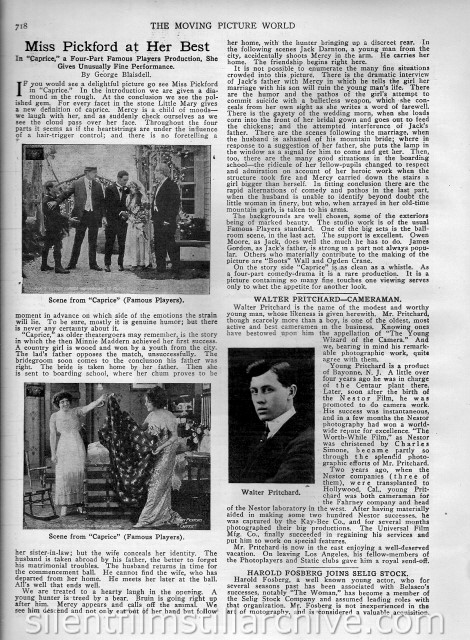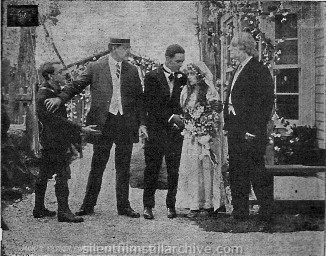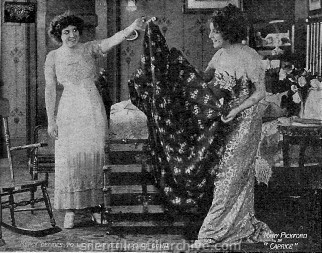![]()

Caprice (1913)

Moving Picture World, November 15, 1913, page 718
Mary Pickford at Her Best
In "Caprice," a Four-Part Famous Players Production, She Gives Unusually Fine Performance
If you would see a delightful picture go see Miss Pickford in "Caprice." In the introduction we are given a diamond in the rough. At the conclusion we see the polished gen. For every facet in the stone Little Mary gives a new definition of caprice. Mercy is a child of moods -- we laugh with her, and as sudenly check ourselves as we see the cloud pass over her face. Throughout the four parts it seems as if the heartstrings are under the influence of a hair-trigger control; and there is no foretelling a moment in advance on which sie of the emotions the strain will lie. To be sure, mostly it is genuine humor; but there is never any certainty about it.

Scene from "Caprice" (Famous Players).
"Caprice", as older theatergoers may remember, is the story in which the then Minnie Maddern achieved her first success. A country girl is wooed and won by a youth from the city. The lad's father opposes the match, unsuccessfully. The bridegroom soon comes to the conclusion his father was fight. The bride is taken home by her father. Then she is sent to boarding school, where her chum proves to be her sister-in-law; but the wife conceals her identity. The husband is taken abroad by his father, the better to forget his matrimonial troubles. The husband returns in time for the commencement ball. He cannot find the wife, who has departed from her home. He meets her later at the ball. All's well that ends well.

Scene from "Caprice" (Famous Players).
We are treated to a hearty laugh in the opening. A young hunter is treed by a bear. Bruin is going right up after him. Mercy appears and calls off the animal. We see him descend and not only eat out of her hand but follow her home, with the hunter bringing up a discreet rear. In the following scenes Jack Darnton, a young man from the city, accidentally shoots Mercy in the arm. He carries her home. The friendship begins right here.
It is not possible to enumerate the many fine situations crowded into this picture. There is the dramatic interview of jack's father with Mercy in which he tells the girl her marriage with his son will ruin the young man's life. There are the humor and the pathos of the girl's attempt to commit suicide with a bulletless weapon, which she conceals from her own sight as she writes a word of farewell. There is the gayety of the wedding morn, whe she loads corn into the front of her bridal gown and goes out to feed the chickens; and the attempted iterference of Jack's father. There are the scenes following the marriage, when the husband is ashamed of his mountain bride; where in response to a suggestionof her father, she puts the lamp in the wondow as a signal for him to come and get her. Then too, there are the many good situations in the boarding school -- the ridicule of her fellow-pupils changed to respect and admiration on account of her heroic work when the structure took fire and Mercy carried down the stairs a girl bigger than herself. In fitting conclusion there are the rapid alternations of comedy and pathos in the last part, when the husband is unable to identify beyond doubt the little woman in finery, but sho, when arrayed in her old-time mountain garb, is taken to his arms.
The backgrounds are well chosen, some of the exteriors being of marked beauty. The studio work is of the usual Famous Players standard. One of the big sets is the ballroom scene, in the last act. The support is excellent. Owen Moore, as Jack, does well the much he has to do. James Gordon, as Jack's father, is strong in a part not always popular. Others who materially contribte to the making of the picture are "Boots" Wall and Ogden Crane.
On the story side, "Caprice" is as clean as a whistle. As a four-part comedy-drama it is a rare production. It is a picture containing so many fine touches one viewing serves only to whet the appetite for another look.
with Mary Pickford, and Owen Moore. Directed by J. Searle Dawley. Paramount/Famous Players.
More Information on this film...

This work (Caprice (1913), by
Famous
Players / Paramount), identified by
Bruce Calvert, is free of known copyright
restrictions.
Books
None.
Last Modified June 22, 2012.



















